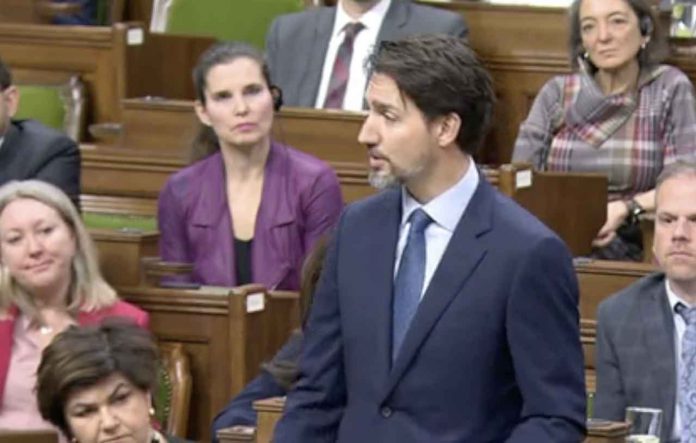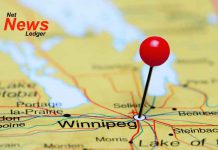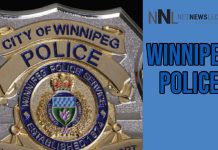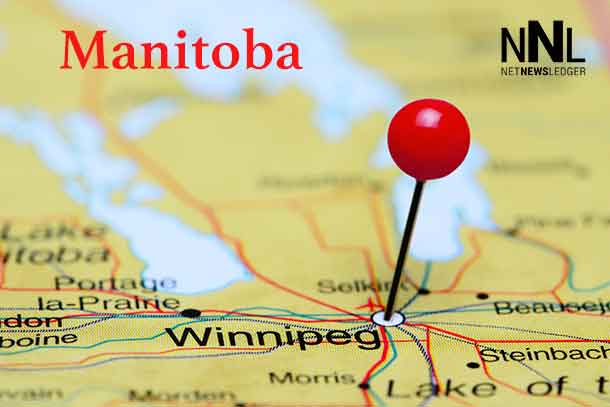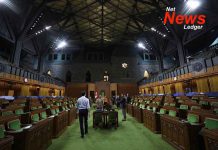WINNIPEG – OPINION – Prime Minister Justin Trudeau has made his decision on the nation-wide rail blockades standing in solidarity with the Wet’suwet’en land defenders challenging a natural-gas pipeline being built through their territory.
“The barricades must come down, the injunctions must be obeyed, the law must be upheld,” Trudeau said Friday.
“Every attempt at dialogue has been made, but discussions have not been productive. We can’t have dialogue when only one party is coming to the table. Canadians who are feeling the very real impact of these blockades are losing patience.”
Gone were the previous calls for patience, listening, and partnership. Instead, standing beside his two ministers of Indigenous affairs, his deputy prime minister, and his minister of public safety, Trudeau gave a green light to police across Canada to remove rail and road occupations, arrest activists — and continue Canada as usual.
Some credit must be given to Conservative Leader Andrew Scheer, who for more than a week had been calling for the tear-down of what he called “illegal blockades” led by “radical activists,” who “need to check their privilege.”
The real credit though, should go to Trudeau’s father, Pierre, whose echo could be heard at the Ottawa news conference. As if channeling his father — who evoked the War Measures Act during the height of the 1970 FLQ crisis in Quebec (giving sweeping powers of arrest and internment to police) and told reporters who accused him of circumventing law: “Just watch me” — Justin Trudeau carved out a legacy of his own.
The problem is, he isn’t imposing Canada’s rule of law nor dealing with militants.
The hereditary leadership of the Wet’suwet’en (most of whom reject the pipeline project on their unceded territory) have been recognized by the Supreme Court in the 1997 Delgamuukw decision as speaking on behalf of the Wet’suwet’en Nation. They are legitimate, legally recognized voices.
Are the hereditary chiefs unified in their decision on this project? No.
Nor are the Indian Act chiefs and councils who govern small First Nations within Wet’suwet’en territory (five of six support the project).
A firmly divided leadership and picking which leaders represent a nation while ignoring others who dissent is — at the bare minimum — a failure to meet Canada’s constitutional “duty to consult” and attain “free, prior, and informed consent” for use of Indigenous lands.
This is not to mention the Wet’suwet’en hereditary chiefs and supporters are peaceful occupants on their own land.
At the same time, “peaceful” defines the rail and road occupations put up in solidarity — mostly by Indigenous activists occupying traditional lands they have been removed from, as well.
In this vein, Trudeau’s call for Canada’s “rule of law” ignores simple truths.
His argument, for example, Indigenous peoples don’t come to the table, comes apart when a simple internet search shows five years ago the same Wet’suwet’en hereditary chiefs proposed the pipeline be built through a different route in their traditional territory.
So, what is the point of putting a nation into crisis, police forces on alert, and inflaming tensions?
Money.
Canadians want to profit off the land, and nothing will stop them. This isn’t a political position; it doesn’t really matter which party is in charge in Ottawa.
Indigenous peoples have land and Canadians want it. Period.
For 150-plus years, Canada’s economy has been built off Indigenous-held territories, and unless Indigenous peoples acquiesce and accept this, armed men will be sent in.
This isn’t whining, complaining, or even a protest. This is the truth, laid bare this week.
Over and over again, Indigenous peoples are told by politicians — from Manitoba Premier Brian Pallister to Trudeau to B.C. Premier John Horgan — they have no right to “veto” Canadian projects.
In a democracy, people have a right to say no (not that the Wet’suwet’en are doing this anyway).
In a treaty (which doesn’t exist for the Wet’suwet’en anyway), one side has the right to say no, too.
However, Indigenous peoples can’t say no. Ever. This is Canadian law.
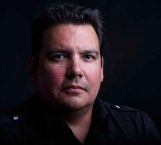 Niigaan Sinclair
Niigaan Sinclair
Originally appeared in the Winnipeg Free Press on February 22, 2020. Republished with the permission of the author.
The views, opinions, and positions expressed by all columnists and contributors are the author’s alone. They do not inherently or expressly reflect the views, opinions and/or positions of NetNewsLedger.

